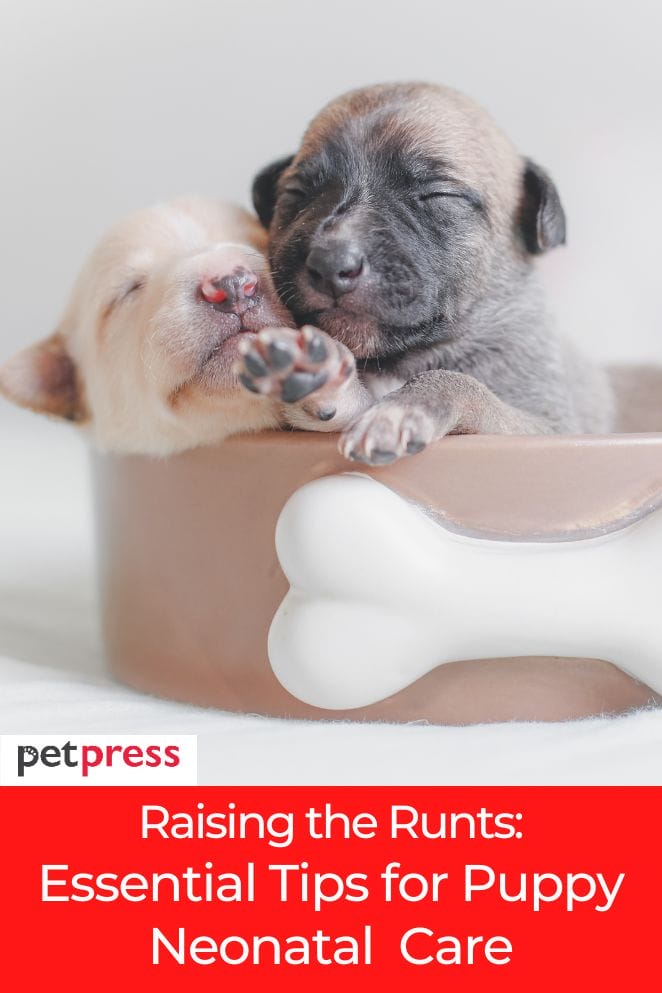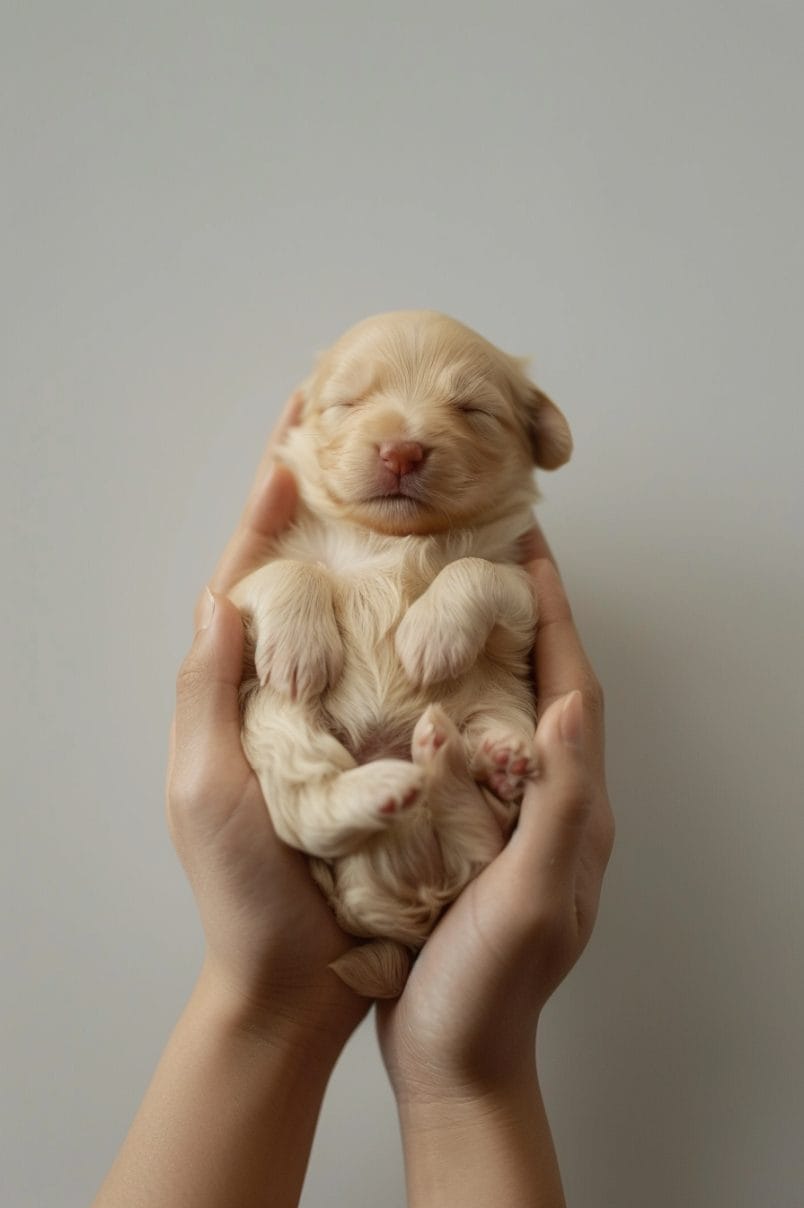
Caring for newborn puppies, especially in the first few weeks of their lives, is crucial for their survival and development.
Proper neonatal care can significantly impact their health and well-being.
In this guide, we’ll explore the critical aspects of puppy neonatal care, from immediate post-birth steps to long-term health monitoring.
Immediate Post-Birth Care
When puppies are born, they require immediate attention to ensure they start life healthy and strong.
Here’s a detailed and easy-to-understand guide on what to do right after a puppy is born:
Clearing the airway
One of the first and most important steps is to make sure the puppy can breathe properly.
Sometimes, puppies are born with fluids or membranes blocking their airways, which can make it difficult for them to take their first breaths.
- Using a bulb syringe: A bulb syringe is a handy tool for this purpose. You can gently insert the tip into the puppy’s nose and mouth to suction out any fluids.
- Using a soft cloth: If you don’t have a bulb syringe, a soft cloth can also work. Gently wipe around the puppy’s nose and mouth to remove any obstructions.
Clearing the airway is crucial because it helps the puppy take in the oxygen they need right from the start.
Stimulating breathing
Sometimes, even after clearing the airways, a puppy might not start breathing on its own.
Here’s how you can help:
- Rubbing with a towel: Take a clean, dry towel and gently rub the puppy’s body. This action can stimulate their breathing by promoting circulation to take their first breaths.
- Blowing air: If the gentle rubbing doesn’t work, you can try blowing a small amount of air into the puppy’s nose and mouth.
Stimulating breathing is vital because, without it, the puppy won’t be able to oxygenate their blood, which is necessary for survival.
Cutting and tying the umbilical cord
After ensuring the puppy is breathing well, the next step is to handle the umbilical cord:
- Cutting the cord: Using sterilized scissors, cut the umbilical cord about an inch away from the puppy’s body.
- Tying the cord: To prevent bleeding and reduce the risk of infection, tie the cord with sterilized thread or dental floss.
Handling the umbilical cord carefully is essential because improper cutting or tying can lead to infections or excessive bleeding, which can be dangerous for the newborn puppy.

Initial Steps for Premature Puppies
Premature puppies need extra care and attention right after birth to ensure they have the best chance at survival.
Here’s a detailed guide on the essential steps to take when caring for these fragile newborns:
Resuscitation
Premature puppies often struggle to start breathing on their own, so resuscitation is sometimes necessary:
- Clearing the airway: Just like with full-term puppies, the first step is to make sure their airways are clear of any fluids or membranes.
- Stimulating breathing: If the puppy isn’t breathing, gently rub its body with a clean, dry towel. This can stimulate their breathing by promoting circulation.
- Chest compressions: If the puppy still doesn’t respond, you may need to perform gentle chest compressions.
Resuscitation is crucial because it can be the difference between life and death for a struggling premature puppy.
Umbilical cord care
Premature puppies are more vulnerable to infections, so handling their umbilical cord with extra care is essential:
- Cutting the cord: Using sterilized scissors, cut the umbilical cord about an inch from the puppy’s body. This distance helps prevent any potential harm to their abdomen.
- Disinfecting the cord: After cutting, it’s important to disinfect the cord to prevent infections. Use a suitable disinfectant and gently apply it to the cord.
Proper care of the umbilical cord is vital for preventing infections, which premature puppies are particularly susceptible to.
APGAR scoring
APGAR scoring is a method used to quickly assess the health of newborn puppies:
- Heart rate: Check the puppy’s heart rate. A strong, regular heartbeat is a good sign.
- Respiration: Observe their breathing. Regular, unlabored breathing indicates good respiratory health.
- Muscle tone: Assess their muscle tone. Active movement and strong muscle tone are positive indicators.
- Vital signs: Look at other signs like color and reflexes.
APGAR scoring helps you quickly determine the overall health status of the puppy and whether they need immediate medical attention.
Weighing
Weighing premature puppies is important for monitoring their growth and health:
- Using a precise scale: Use a precise scale to weigh the puppy. This helps confirm their premature status and gives you a baseline weight to monitor.
- Recording the weight: Keep a daily record of the puppy’s weight. Regular monitoring helps you detect any growth issues early on.
Consistent weighing and monitoring are key to ensuring that the puppy is developing properly and receiving the necessary care.

Feeding and Nutrition
Ensuring that newborn puppies receive the right nutrition and care is vital for their growth and health.
Here’s a detailed guide to feeding and nutrition for puppies, especially focusing on premature ones.
Initial feeding
- Colostrum importance: The first milk that a mother dog produces after giving birth is called colostrum.
- Nursing within the first hour: It’s important to make sure the puppy starts nursing within the first hour after birth.
- Alternative feeding: If the mother is unable to nurse the puppies for any reason, consult your veterinarian right away.
Monitoring feeding
- Observing the puppies: Watch the puppies closely to ensure they are feeding properly. They should latch onto the mother and nurse without much trouble.
- Veterinarian consultation: If you notice any issues with feeding, it’s essential to consult your veterinarian promptly.
Special feeding for premature puppies
- Specialized milk replacers: Premature puppies might require specialized milk replacers designed to meet their unique nutritional needs.
- Feeding schedule: Follow a specific feeding schedule provided by your veterinarian. Premature puppies often need to be fed more frequently.

Temperature and Humidity Control
Keeping newborn puppies, especially premature ones, in a warm and humid environment is crucial for their health and development.
Maintaining temperature
- Ideal temperature: The ideal temperature for a newborn puppy’s environment is between 85-90°F (29-32°C).
- Heating methods: Use a heating pad or a heat lamp to maintain this temperature. Make sure the heat source is safe and there is no risk of burns.
- Gradual temperature reduction: As the puppies grow, you can gradually reduce the temperature of their environment.
Humidity control
- Ideal humidity levels: Maintaining proper humidity levels is important to prevent the puppy’s skin from drying out. Aim for a humidity level of around 55-65%.
- Using a humidifier: A humidifier can help maintain the right humidity levels in the puppies’ environment.
Monitoring Health and Development
Weight monitoring
Regularly weigh your puppy to make sure they’re growing well.
A steady weight gain is important for their development.
If you notice their weight isn’t going up as expected or starts to drop, it could be a sign of health problems.
Get in touch with your vet if you’re concerned.
Blood glucose levels
Keep an eye on your puppy’s blood sugar levels.
This helps ensure they have enough energy and feel good.
Low or high blood sugar levels can affect their health, so stable levels are important.
If you notice any unusual changes in their energy or behavior, your vet can help check their blood sugar.
Temperature monitoring
Check your puppy’s temperature regularly.
Their normal temperature should be between 97 to 100 degrees Fahrenheit.
If it’s too high or too low, it might mean they’re not feeling well.
Contact your vet if their temperature seems off.

Socialization and Early Development
Socialization
Socialize your puppy early by introducing them to new people, places, and experiences.
This helps them grow up to be confident and well-behaved.
Start around 3 to 4 weeks old and gradually expose them to different things.
It’s like teaching them how to feel comfortable in the world around them.
Early handling
Handle your puppy gently and often.
This helps them get used to the human touch and builds a strong bond with you.
It’s important for their future visits to the vet and grooming sessions.
This early interaction also helps them feel safe and secure with people.
Veterinary Care
Regular check-ups
Just like people, puppies need regular check-ups with the veterinarian to make sure they’re growing up healthy.
These check-ups are like health exams that help the vet catch any problems early on.
They’ll also track your puppy’s growth and development to ensure everything is on track.
Vaccination and deworming
- Vaccination: Vaccines are like shields that protect your puppy from serious illnesses. Your vet will give your puppy shots at specific times to build up their immune system.
- Deworming: Puppies can pick up worms from their environment or from their mother. Deworming treatments help get rid of these worms and prevent them from causing health issues.

Conclusion
Caring for newborn puppies requires attention to detail and a proactive approach.
By ensuring proper airway clearance, stimulating breathing, maintaining appropriate temperature and humidity, and monitoring health closely, you can give your puppies the best start in life.
Always consult with a veterinarian for any concerns or complications to ensure your puppies grow into healthy, happy dogs.
FAQs
If your puppy isn’t breathing, gently rub its body with a clean, dry towel to stimulate breathing. You can also try blowing gently into its nose and mouth.
Premature puppies may need to be fed every 2-3 hours. Use specialized canine milk replacers and follow your veterinarian’s feeding schedule.
Maintain a temperature of 85-90°F using a heating pad or heat lamp. Gradually reduce the temperature as the puppies grow.
Begin socializing your puppy at around 3-4 weeks old by introducing it to different people and environments.
Follow your veterinarian’s vaccination schedule, which typically includes vaccines for distemper, parvovirus, and rabies.
- Does Cat Litter Melt Ice? The Complete Guide to Winter Safety - January 30, 2026
- Happy Tail Dogs: Understanding This Common Canine Condition - January 29, 2026
- How Cold Can Outdoor Cats Handle? Feline Winter Safety - January 27, 2026


GIPHY App Key not set. Please check settings